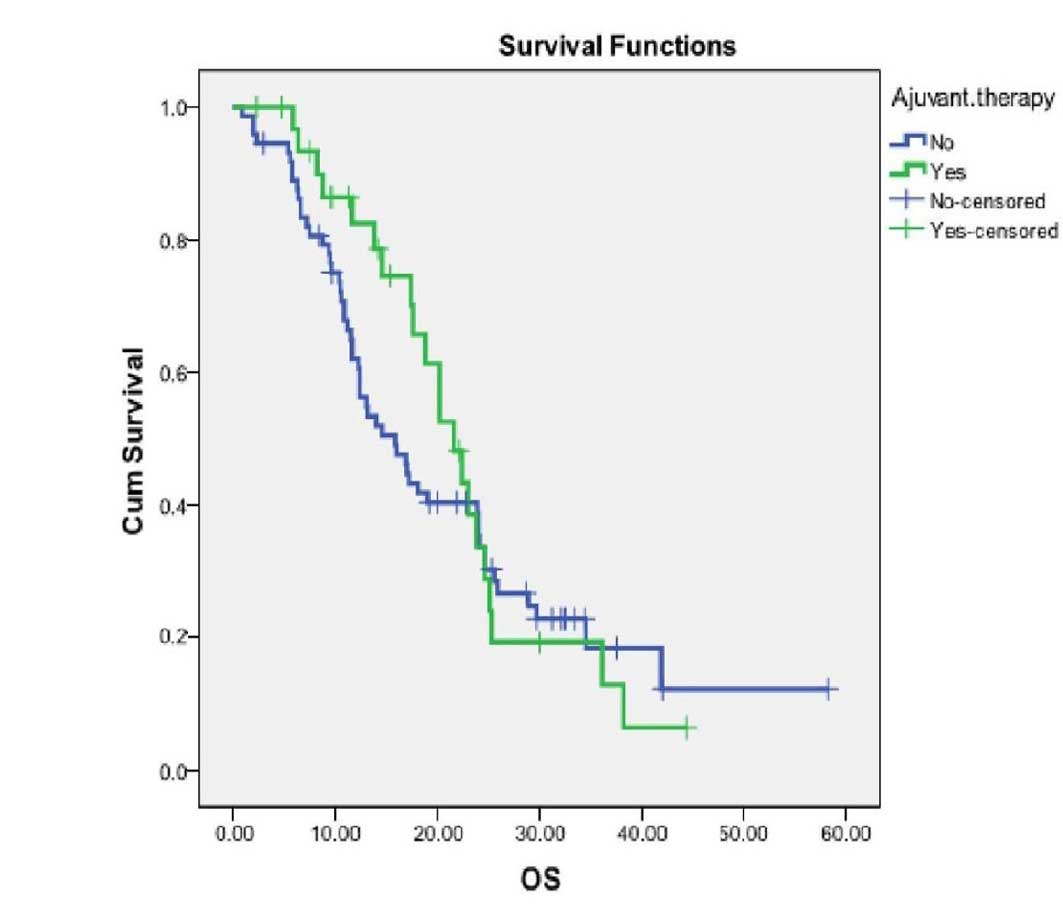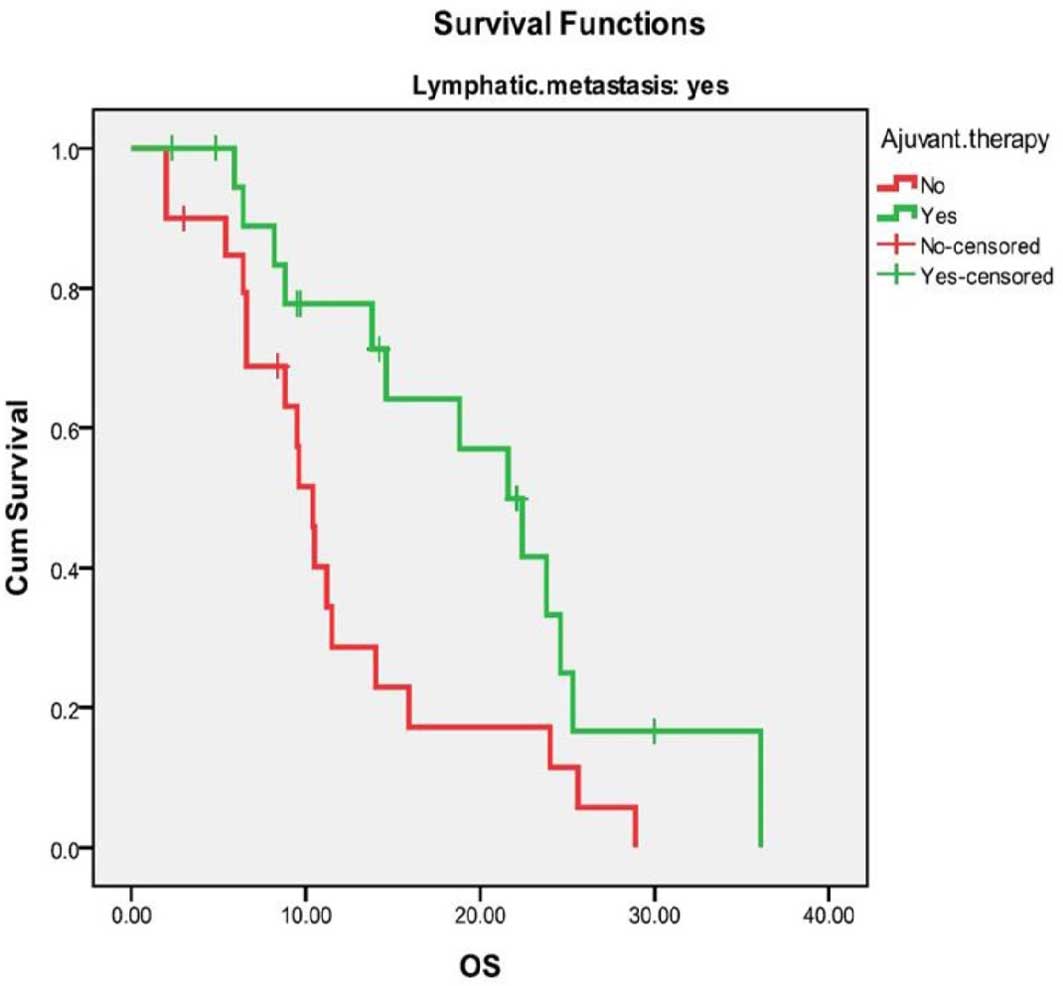|
1
|
Castro FA, Koshiol J, Hsing AW and Devesa
SS: Biliary tract cancer incidence in the United States-Demographic
and temporal variations by anatomic site. Int J Cancer.
133:1664–1671. 2013. View Article : Google Scholar : PubMed/NCBI
|
|
2
|
Gwak HK, Kim WC, Kim HJ and Park JH:
Extrahepatic bile duct cancers: surgery alone versus surgery plus
postoperative radiation therapy. Int J Radiat Oncol Biol Phys.
78:194–198. 2010. View Article : Google Scholar : PubMed/NCBI
|
|
3
|
Murakami Y, Uemura K, Sudo T, et al:
Adjuvant gemcitabine plus S-1 chemotherapy improves survival after
aggressive surgical resection for advanced biliary carcinoma. Ann
Surg. 250:950–956. 2009. View Article : Google Scholar
|
|
4
|
Aljiffry M, Walsh MJ and Molinari M:
Advances in diagnosis, treatment and palliation of
cholangiocarcinoma: 1990–2009. World J Gastroenterol. 15:4240–4262.
2009.PubMed/NCBI
|
|
5
|
Pattanathien P, Khuntikeo N, Promthet S
and Kamsa-Ard S: Survival rate of extrahepatic cholangiocarcinoma
patients after surgical treatment in Thailand. Asian Pac J Cancer
Prev. 14:321–324. 2013. View Article : Google Scholar : PubMed/NCBI
|
|
6
|
Nagorney DM, Donohue JH, Farnell MB,
Schleck CD and Ilstrup DM: Outcomes after curative resections of
cholangiocarcinoma. Arch Surg. 128:871–879. 1993. View Article : Google Scholar : PubMed/NCBI
|
|
7
|
Kim JW, Jo S, Moon HJ, Heo JS, Choi SH,
Joh JW, Choi DW, Chung JC and Kim YI: Prognostic factors after
major resection for distal extrahepatic cholangiocarcinoma. Korean
J Gastroenterol. 47:144–152. 2006.(In Korean).
|
|
8
|
Woo SM, Ryu JK, Lee SH, et al: Recurrence
and prognostic factors of ampullary carcinoma after radical
resection: comparison with distal extrahepatic cholangiocarcinoma.
Ann Surg Oncol. 14:3195–3201. 2007. View Article : Google Scholar
|
|
9
|
Unno M, Katayose Y, Rikiyama T, et al:
Major hepatectomy for perihilar cholangiocarcinoma. J Hepatobiliary
Pancreat Sci. 17:463–469. 2010. View Article : Google Scholar : PubMed/NCBI
|
|
10
|
Anderson C and Kim R: Adjuvant therapy for
resected extrahepatic cholangiocarcinoma: a review of the
literature and future directions. Cancer Treat Rev. 35:322–327.
2009. View Article : Google Scholar : PubMed/NCBI
|
|
11
|
Horgan AM, Amir E, Walter T and Knox JJ:
Adjuvant therapy in the treatment of biliary tract cancer: a
systematic review and meta-analysis. J Clin Oncol. 30:1934–1940.
2012. View Article : Google Scholar : PubMed/NCBI
|
|
12
|
Khan SA, Thomas HC, Davidson BR and
Taylor-Robinson SD: Cholangiocarcinoma. Lancet. 366:1303–1314.
2005. View Article : Google Scholar : PubMed/NCBI
|
|
13
|
Shimoda M and Kubota K: Multi-disciplinary
treatment for cholangiocellular carcinoma. World J Gastroenterol.
13:1500–1504. 2007. View Article : Google Scholar : PubMed/NCBI
|
|
14
|
Takada T, Amano H, Yasuda H, et al: Is
postoperative adjuvant chemotherapy useful for gallbladder
carcinoma? A phase III multicenter prospective randomized
controlled trial in patients with resected pancreaticobiliary
carcinoma. Cancer. 95:1685–1695. 2002. View Article : Google Scholar
|
|
15
|
Sasaki R, Takeda Y, Funato O, Nitta H,
Kawamura H, Uesugi N, Sugai T, Wakabayashi G and Ohkohchi N:
Significance of ductal margin status in patients undergoing
surgical resection for extrahepatic cholangiocarcinoma. World J
Surg. 9:1788–1796. 2007. View Article : Google Scholar : PubMed/NCBI
|
|
16
|
Edge SB, Byrd DR, Compton CC, Fritz AG,
Greene FL and Trotti A: AJCC Cancer Staging Manual. 7th Edition.
New York: Springer; pp. 66–71. 2010
|
|
17
|
Kiriyama S, Takada T, Strasberg SM, et al;
Tokyo Guidelines Revision Committee. New diagnostic criteria and
severity assessment of acute cholangitis in revised Tokyo
Guidelines. J Hepatobiliary Pancreat Sci. 19:548–556. 2012.
View Article : Google Scholar : PubMed/NCBI
|
|
18
|
Fuller CD, Wang SJ, Choi M, et al:
Multimodality therapy for locoregional extrahepatic
cholangiocarcinoma: a population-based analysis. Cancer.
115:5175–5183. 2009. View Article : Google Scholar : PubMed/NCBI
|
|
19
|
Cheng Q, Luo X, Zhang B, Jiang X, Yi B and
Wu M: Predictive factors for prognosis of hilar cholangiocarcinoma:
postresection radiotherapy improves survival. Eur J Surg Oncol.
33:202–207. 2007. View Article : Google Scholar
|
|
20
|
Khuntikeo N, Pugkhem A, Bhudhisawasdi V
and Uttaravichien T: Major hepatic resection for hilar
cholangiocarcinoma without preoperative biliary drainage. Asian Pac
J Cancer Prev. 9:83–85. 2008.PubMed/NCBI
|
|
21
|
Li H, Qin Y, Cui Y, Chen H, Hao X and Li
Q: Analysis of the surgical outcome and prognostic factors for
hilar cholangiocarcinoma: a Chinese experience. Dig Surg.
28:226–231. 2011. View Article : Google Scholar : PubMed/NCBI
|
|
22
|
Cho JY, Han HS, Yoon YS, et al:
Preoperative cholangitis and metastatic lymph node have a negative
impact on survival after resection of extrahepatic bile duct
cancer. World J Surg. 36:1842–1847. 2012. View Article : Google Scholar : PubMed/NCBI
|
|
23
|
Liu RQ, Shen SJ, Hu XF, Liu J, Chen LJ and
Li XY: Prognosis of the intrahepatic cholangiocarcinoma after
resection: hepatitis B virus infection and adjuvant chemotherapy
are favorable prognosis factors. Cancer Cell Int. 13:992013.
View Article : Google Scholar
|
|
24
|
Luo X, Yuan L, Wang Y, Ge R, Sun Y and Wei
G: Survival outcomes and prognostic factors of surgical therapy for
all potentially resectable intrahepatic cholangiocarcinoma: a large
single-center cohort study. J Gastrointest Surg. 18:562–572. 2014.
View Article : Google Scholar
|
|
25
|
Wirasorn K, Ngamprasertchai T, Khuntikeo
N, et al: Adjuvant chemotherapy in resectable cholangiocarcinoma
patients. J Gastroenterol Hepatol. 28:1885–1891. 2013. View Article : Google Scholar : PubMed/NCBI
|
|
26
|
Vern-Gross TZ, Shivnani AT, Chen K, et al:
Survival outcomes in resected extrahepatic cholangiocarcinoma:
effect of adjuvant radiotherapy in a surveillance, epidemiology,
and end results analysis. Int J Radiat Oncol Biol Phys. 81:189–198.
2011. View Article : Google Scholar
|
|
27
|
Pitt HA, Nakeeb A, Abrams RA, Coleman J,
Piantadosi S, Yeo CJ, Lillemore KD and Cameron JL: Perihilar
cholangiocarcinoma. Postoperative radiotherapy does not improve
survival. Ann Surg. 221:788–798. 1995. View Article : Google Scholar : PubMed/NCBI
|
|
28
|
Valle J, Wasan H, Palmer DH, et al; ABC-02
Trial Investigators. Cisplatin plus gemcitabine versus gemcitabine
for biliary tract cancer. N Engl J Med. 362:1273–1281. 2010.
View Article : Google Scholar : PubMed/NCBI
|
|
29
|
Murakami Y, Uemura K, Sudo T, et al:
Gemcitabine-based adjuvant chemotherapy improves survival after
aggressive surgery for hilar cholangiocarcinoma. J Gastrointest
Surg. 13:1470–1479. 2009. View Article : Google Scholar : PubMed/NCBI
|
|
30
|
Murakami Y, Uemura K, Sudo T, et al:
Adjuvant chemotherapy with gemcitabine and S-1 after surgical
resection for advanced biliary carcinoma: outcomes and prognostic
factors. J Hepatobiliary Pancreat Sci. 19:306–313. 2012. View Article : Google Scholar : PubMed/NCBI
|
|
31
|
Yamanaka K, Hatano E, Kanai M, et al: A
single-center analysis of the survival benefits of adjuvant
gemcitabine chemotherapy for biliary tract cancer. Int J Clin
Oncol. 19:485–489. 2014. View Article : Google Scholar : PubMed/NCBI
|
|
32
|
Neoptolemos JP, Moore MJ, Cox TF, et al;
European Study Group for Pancreatic Cancer. Effect of adjuvant
chemotherapy with fluorouracil plus folinic acid or gemcitabine vs
observation on survival in patients with resected periampullary
adenocarcinoma: the ESPAC-3 periampullary cancer randomized trial.
JAMA. 308:147–156. 2012. View Article : Google Scholar
|
|
33
|
Hughes MA, Frassica DA, Yeo CJ, et al:
Adjuvant concurrent chemoradiation for adenocarcinoma of the distal
common bile duct. Int J Radiat Oncol Biol Phys. 68:178–182. 2007.
View Article : Google Scholar : PubMed/NCBI
|
|
34
|
Borghero Y, Crane CH, Szklaruk J, et al:
Extrahepatic bile duct adenocarcinoma: patients at high-risk for
local recurrence treated with surgery and adjuvant chemoradiation
have an equivalent overall survival to patients with standard-risk
treated with surgery alone. Ann Surg Oncol. 15:3147–3156. 2008.
View Article : Google Scholar
|
|
35
|
Bonet Beltran M, Roth AD, Mentha G and
Allal AS: Adjuvant radio-chemotherapy for extrahepatic biliary
tract cancers. BMC Cancer. 11:2672011.
|
|
36
|
Narang AK, Miller RC, Hsu CC, et al:
Evaluation of adjuvant chemoradiation therapy for ampullary
adenocarcinoma: the Johns Hopkins Hospital-Mayo Clinic
collaborative study. Radiat Oncol. 6:1262011. View Article : Google Scholar : PubMed/NCBI
|
|
37
|
Park JH, Choi EK, Ahn SD, et al:
Postoperative chemoradiotherapy for extrahepatic bile duct cancer.
Int J Radiat Oncol Biol Phys. 79:696–704. 2011. View Article : Google Scholar : PubMed/NCBI
|
|
38
|
Habermehl D, Lindel K, Rieken S, et al:
Chemoradiation in patients with unresectable extrahepatic and hilar
cholangiocarcinoma or at high risk for disease recurrence after
resection: Analysis of treatment efficacy and failure in patients
receiving postoperative or primary chemoradiation. Strahlenther
Onkol. 188:795–801. 2012. View Article : Google Scholar
|
















